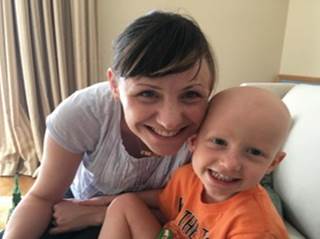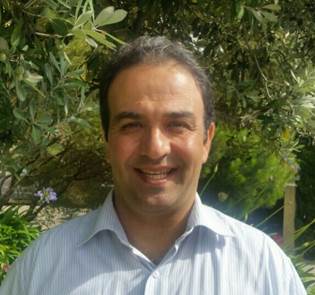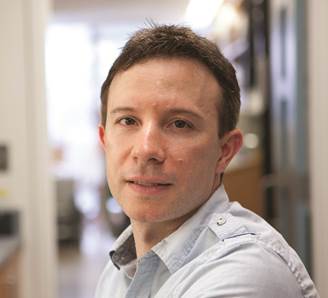
Erin Gordon, MD
School of Medicine - Medicine
Family Support Award
Understanding the Molecular Mechanisms and Causal Variants of Asthma GWAS Loci: IL1RL1 and IL33
The Family Support Award from RAP will help me start up my new lab in the SABRE Asthma Research Center on the second floor of Parnassus. I am a newly recruited physician-scientist in the Pulmonary Critical Care Division in the Department of Medicine. My 3 year old son is currently undergoing chemotherapy and radiation for a malignant rhabdomyosarcoma, and I have to take him to frequent doctors appointments. He is nearly cancer free, and this award will partially support a post-doctoral fellow during this critical time in my career. My work seeks to determine the causal genetic variants and molecular mechanisms of the three most replicated asthma genetic loci: IL1RL1, IL33 and GSDMB. We use novel techniques such as CRISPR-Cas9 and ATAC-seq in primary airway epithelial cells to test the function of suspected causal single nucleotide polymorphisms. This information can be directly translated into novel drug targets for asthma and biomarkers for the patients likely to benefit from treatment.

Edward Hsiao, MD, PhD
School of Medicine - Medicine
Pilot for Established Investigators in Basic and Clinical/Translational Sciences
Linking Innate Immune Dysfunction to Abnormal Bone Formation
The overall goals of our research are to understand how the musculoskeletal system develops, what happens to cause skeletal diseases, and how we can develop novel therapies for these conditions. We use a combination of human genetics and model systems, including human iPS cells and murine models. Our recent studies focus on fibrodysplasia ossificans progressiva (FOP), an ultra-rare genetic disease where bone forms at abnormal sites. The PREMIER RAP award will allow us to elucidate how the inflammatory system affects bone formation and repair in FOP. This study will also generate new macrophage activation data that may explain why FOP patients are exquisitely sensitive to trauma as a trigger for their abnormal bone formation. Finally, understanding the mechanisms in FOP may help develop the first biomarkers for detecting disease activity and identify potential targets for preventing heterotopic bone formation that can occur after a wide variety of injuries such as hip and back surgeries.

Kartika Palar, PhD
School of Medicine - Medicine
Mentored Scientist Award Program in HIV/AIDS
Impact of a Novel Multicomponent Nutrition Intervention on Cardiovascular Disease Risk Factors Among Food-insecure Adults with HIV in the Dominican Republic
This CFAR grant supports our team to investigate the impact of a novel, community-based intervention on cardiovascular disease (CVD) risk factors among people with HIV and food insecurity in the Dominican Republic (DR). CVD is the leading cause of mortality in Latin America and the Caribbean (LAC), and has arisen as a major clinical and public health challenge in HIV. Social and economic vulnerability may potentiate increased CVD risk among people living with HIV by reducing access to a healthy diet, increasing stress, and increasing maladaptive coping behaviors. In particular, research suggests food insecurity as a key structural barrier that may undermine CVD prevention efforts among people with HIV. In LAC, interventions to reduce modifiable CVD risk factors among food-insecure people with HIV are critically needed. The ProMeSA (Proyecto para Mejorar la Seguridad Alimentaria) parent intervention study, led by colleagues at RAND and the UN World Food Programme, integrates peer nutritional counseling with household-level urban gardens in order to improve HIV treatment adherence via improved food security. We will add a range of measures to this study to investigate the impact of ProMeSA on CVD risk factors, including objective assessments blood pressure, hemoglobin a1c, cholesterol, and obesity as well as self-reported diet quality, physical activity, alcohol use, and perceived stress. This study will provide some of the first data from LAC on community-based approaches to reduce CVD risk among food-insecure people with HIV, with the goal to contribute towards improved long-term outcomes and reduced health disparities.

Omid Madadgar, PhD
School of Medicine - Medicine
International Mentored Scientist Award Program in HIV/AIDS
Reactivation of HIV Transcription from Latently Infected Cells by Some Iranian Herbal Extracts
The RAP International Mentored Scientist Award Program in HIV/AIDS provides us the unique opportunity to test the valuable Iranian herbal component to help the AIDS patients. Actually in the poor countries, many of peoples cannot pay cost of treatment and endure very unfortunate conditions. On the other hand, highly active antiretroviral therapy (HAART) can reduce plasma human immunodeficiency virus (HIV) to undetectable levels indefinitely but interruption of HAART, however, inevitably results in a rapid rebound of viremia, indicating that antiretroviral therapy-mediated viral suppression alone is unlikely to eradicate HIV. HIV DNA can integrate stably into the DNA of resting memory T cells where it persists until these cells die. This major reservoir has an estimated half-life of 44 months, suggesting that 70 years of HAART treatment would be required for its eradication. Thus, designing new approaches to purge the reservoir of HIV is critical for speeding the treatment of HIV patients. In this research, we examine the effect of herbal extracts commonly used to induce immunity by proliferation of immune cells such as T cells in Iran by various HIV and cellular based assays available at UCSF to provide important information to develop effective and affordable anti-HIV latency therapies to those who have limited access to expensive modern medicine.

Kathryn A. Phillips, PhD
School of Pharmacy - Clinical Pharmacy
Pilot for Established Investigators in Basic and Clinical/Translational Sciences
Building the Evidence Base for Appropriate and Equitable Reimbursement of New Genomic Testing Technologies: A Pilot Study on Tumor Profiling Tests and the UCSF500 Test
New sequencing technologies are enabling the use of genetic tests that measure multiple rather than single genes, and these tests are rapidly entering clinical care. However, multigene tests are often costly and insurers often do not cover them, raising questions such as:
- Will patients have equitable access to these tests, particularly those who are uninsured/under-insured or unable to pay out-of-pocket?
- Can medical centers provide financially sustainable testing within the changing health care environment?
Tumor profiling tests provide an excellent case study for examining reimbursement challenges and solutions. These tests are often not covered by payers and they are relatively costly.
RAP funding will enable us to conduct a feasibility study of reimbursement for tumor profiling tests using a case study of the UCSF500 test. This test is being used at UCSF to interrogate a spectrum of genes for cancer patients, enhance selection of therapies, and inform the overall course of care. Our objective is to develop an approach to assessing reimbursement for tumor profiling tests in clinical practice and to obtain pilot data for a future grant proposal with a multi-disciplinary team. The ultimate goal is to develop the evidence base needed so that patients can have access to the technologies are most clinically appropriate for them. Our team includes key clinical leaders in the UCSF Helen Diller Family Comprehensive Cancer Center.

Scott A. Oakes, M.D.
School of Medicine – Pathology
Pilot Award for Pancreas Cancer
A Novel Form of Hereditary Pancreatitis: A Major Pancreatic Cancer Susceptibility Syndrome
Over 100,000 Americans suffer from chronic pancreatitis (CP), a progressive inflammatory disease characterized by abdominal pain, loss of pancreatic function, and elevated risk of diabetes, osteoporosis, and pancreatic cancer. In fact, patients with hereditary pancreatitis have a >50-fold increased risk for pancreatic adenocarcinoma that results from prolonged pancreatic exposure to chronic inflammation. To date, inherited mutations in 6 pancreatic enzymes or their inhibitors have been found to promote autodigestion of the pancreas and chronic pancreatitis in a subset of these patients. Most of the known mutations result in de-regulation of trypsin, a pancreatic enzyme that catalyzes a proteolytic cascade in the small intestine, leading to autodigestion and inflammation of the exocrine pancreas. However, mutations in trypsin and its effectors are not found in most patients with CP, suggesting that other mechanisms are yet to be uncovered. In collaboration with Mark Anderson’s group at UCSF, we recently rediscovered a previously phenotyped but uncharacterized kindred in Northern California with a particularly aggressive form of familial pancreatitis. Using whole exome sequencing, we ruled out known CP-associated mutations and traced the likely causative lesion to a novel mutation in a pancreas-specific protease that has not been previously linked to CP. The goal of this proposal is to determine the exact mechanisms that underlie the pathogenesis of this disease-causing variant using a variety of biochemical and molecular biology approaches alongside a novel mouse model of pancreatitis. These studies should provide fresh insight into the pathogenesis of CP, uncover therapeutic targets for both familial and sporadic pancreatitis, and rapidly translate into genetic testing and early intervention for a newly discovered pancreatic cancer susceptibility syndrome.

Erin L. Van Blarigan, ScD
School of Medicine – Epidemiology & Biostatistics
Integrative Cancer Pilot Award
A Complementary Physical Activity Intervention Using Digital Health Tools for Colorectal Cancer Patients During Chemotherapy
Colorectal cancer (CRC) is the 4th most common cancer and 2nd most common cause of cancer death in the United States. Physical activity is a promising complementary therapy for CRC. Patients with stage III colon cancer who reported more vs. less physical activity [approx. walking ≥6 vs. 1 hr/wk] had 49% greater disease-free survival. There is a critical need for feasible and sustainable physical activity interventions in CRC. Our team has developed a digital health physical activity intervention, Smart Pace, which includes a wearable tracker (Fitbit) and text messaging and aims to have patients build up to 150 min/wk of moderate activity. In this Integrative Cancer Pilot Award, we propose to expand and improve Smart Pace, including: 1) enrolling patients during chemotherapy; 2) tailoring text messages to individual preferences and treatment timing; and 3) adding resources to support home-based exercise. We propose a 12-week pilot randomized controlled trial (RCT) to evaluate the feasibility of this novel digital health physical activity intervention among 48 CRC patients on chemotherapy. Our specific aims are to: 1) Determine the feasibility of the intervention via adherence and attrition, and determine the acceptability of the intervention via questionnaires and semi-structured interviews. 2) Estimate the effect of the intervention vs. usual care on physical activity, fitness, QOL, fatigue, pain, neuropathy, and sleep at 12- and 24-weeks. And 3) Explore the impact of the intervention vs. usual care on weight, waist circumference, and blood pressure at 12-weeks. This award will foster collaboration between epidemiology and oncology at the Cancer Center with integrative oncology at the Osher Center for Integrative Medicine. We will generate strong preliminary data for a competitive R01 application to determine whether a digital health lifestyle intervention improves QOL and reduces risk of recurrence for CRC patients.

Aric A. Prather, PhD
School of Medicine – Psychiatry
One-Year Innovation Award in Prematurity Research
Identifying Biological Drivers of Preterm Birth Among Women With Insomnia
Pregnancy is a key life transition when sleep is often compromised. By some estimates as many as 75% of pregnant women report poor overall sleep quality. Unfortunately, sleep is rarely assessed during prenatal visits. In part, this is because sleep disturbance is so common among pregnant women and it is difficult for clinicians to separate out women who have typical sleep complaints from those with more severe, and possibly toxic, sleep concerns. Insufficient sleep in pregnancy can have implications for the health of the baby. Using data from the California Birth Registry, we found that being diagnosed with insomnia during pregnancy was associated with a 30% increased odds of having a preterm birth (Felder et al., in press). But how? The goal of this RAP-funded project is to identify the biological processes that lead women with insomnia to deliver preterm. Using blood samples from the California Biobank Program, we will comprehensively examine blood samples from 150 women, including women with and without insomnia who either experienced a spontaneous preterm birth or delivered at term. Findings from this project will 1) lead to a critical advancement in our understanding of how insomnia “gets under the skin” to affect preterm birth and 2) highlight new biological targets for prevention of preterm birth among women with insomnia.

Aoife O’Donovan, PhD
School of Medicine – Psychiatry and Weill Institute for Neurosciences
Remote RePS: An Entirely Remote Study of an Attention Bias Modification Training “App” for Posttraumatic Stress Disorder
Digital Mental Health Award Track
This Digital Mental Health RAP Award will allow us to conduct a remote randomized controlled trial of a mobile application we have developed for people with posttraumatic stress disorder (PTSD). PTSD is a chronic and disabling disorder that affects about 8% of the general population and up to 31% of military veterans. Exaggerated threat sensitivity underlies several symptoms of PTSD, and may also contribute to the high risk for physical illness seen in people with PTSD. We have developed a mobile phone “app” to deliver threat-related attention bias modification training (ABM), which shows promise as an intervention to reduce threat sensitivity. Our pilot laboratory-based study of this app confirmed its high level of acceptability to patients with PTSD and suggested that patients are willing and able to engage with the app and complete a training module every day. The RAP grant will allow us to conduct a remote clinical trial of the app to examine if use of this app can reduce levels of threat sensitivity and posttraumatic stress symptoms in individuals with PTSD. The team for this project includes Drs. Andrea Niles, Ana Pesquita, Josh Woolley, Thomas Neylan and Sophia Vinogradov.

Mo Lihong, MD, PhD
UCSF Fresno, Obstetrics and Gynecology
How does progesterone prevent preterm delivery?
One-Year Innovation Award in Prematurity Research
Intramuscular or vaginal progesterone is the only available evidence-based intervention to prevent preterm birth, although patient response to progesterone varies significantly among individuals. There are also many systemic barriers to starting progesterone therapy at a sufficiently early gestational age. Low socioeconomic status, late or insufficient prenatal care, and lack of medical insurance pose major obstacles for initiarting pricey progesterone injections. The promise of big data in Obstetrics is that it may help us tease out answers to complicated problems in our less-than-ideal health care delivery systems. Our goal is to understand the clinical characteristics of high risk patients who are most likely to respond to progesterone therapy, whether vaginal or intramuscular progesterone is more effective at prolonging pregnancy in women with short cervix, and whether starting progesterone belatedly in the third trimester carries potential benefit. This grant allows us to apply the state-of-art data mining technology using firsthand healthcare records to answer these complicated questions in prematurity prevention.

Keith Yamamoto, PhD
School of Medicine - Cellular & Molecular Pharmacology
Molecular Analysis of Glucocorticoid-Resistant Acute Lymphoblastic Leukemia
Pilot for Established Investigators in Basic and Clinical/Translational Sciences
B-cell precursor acute lymphocytic leukemia (BCP-ALL) is commonly treated effectively with chemotherapy protocols that include glucocorticoids (GCs) such as prednisone (pred) or dexamethasone (dex), compounds that bind to the intracellular glucocorticoid receptor (GR) and modulate gene transcription. In these cases, the GC-bound GR triggers apoptosis of B-cell blasts and tumor regression. Unfortunately, however, GCs fail to inhibit blast proliferation in a proportion of cases, and these patients suffer a poor prognosis. Thus, it appears that GR functions differently in these two leukemic disease states. The RAP award will supply us with valuable resources to identify specific genomic regulatory regions, glucocorticoid response elements (GREs), that drive the differential GR activities, and to characterize the transcriptional regulatory complexes (TRCs) that assemble at those GREs. Using this award, we plan to [1] validate causative primary regulated genes (CPRGs), i.e., genes essential for glucocorticoid sensitivity in BCP-ALL, and identify by CRISPR/Cas9 genome editing the functional GRE from amongst multiple specific GR-occupied regions (GORs) proximal (±200kb) to each CPRG; and [2] reconstitute or isolate CPRG GRE TRCs from GC-sensitive and GC-resistant blasts, defining and comparing compositional and functional differences in the two disease states. By linking molecular and mechanistic features to functional differences, these studies will identify new potential drug targets, and at the same time provide for the first time a basis for simple, rapid molecular mechanism-based assays for GR ligands that re-establish GC sensitivity in GC-resistant disease.

Adam R. Ferguson, PhD
School of Medicine - Weill Institute for Neurosciences - Brain and Spinal Injury Center (BASIC)
Neuronal Plasticity Resulting from Limb Disuse-induced Spinal Deconditioning as a Mechanism for Low Back Pain and Muscle Spasticity
Pilot for Established Investigators in Basic and Clinical/Translational Sciences
Spinal deconditioning due to the long-term adaptation to musculoskeletal disuse contributes to the increased risk of intervertebral disc herniation and low back pain. This effect is seen in disuse/inactivity conditions such as patients with bed-rest and in microgravity conditions experienced by astronauts. However the underlying mechanisms remain unclear. We hypothesize that mal-adaptive spinal cord plasticity resulting from spinal deconditioning in simulated long-term inactivity, impacts spinal motor-neuronal pathways, contributing to paraspinal muscle dysfunction leading to low back pain. Our proposed RAP/CCMBM project will test this hypothesis using spinal cord tissues obtained from orthopedic/NASA collaboration using established confocal microscopic and biochemical analysis of spinal cord tissue from ground-based and spaceflight models of chronic disuse. We will provide new neuronal insights into musculoskeletal diseases and orthopedic conditions, and will set the stage for NIH R01 and NASA grants for expanded projects. (This project is a collaboration spearheaded by postdoc Kazuhito Morioka, MD/PhD).

Susan Lynch Ph.D., Professor
Suzanne Sharpton M.D., Fellow
Department of Medicine, Division of Gastroenterology
Pilot for Established Investigators in Basic and Clinical/Translational Sciences
Dysbiosis of the Inter-kingdom Gut Microbiota: Implications for Nonalcoholic Fatty Liver Disease Severity
Due to the growing epidemic of obesity, nonalcoholic fatty liver disease (NAFLD) is now the leading cause of liver disease in the United States. NAFLD encompasses a spectrum of disease with discrete histologic phenotypes of varying severity, ranging from simple steatosis to a more severe form of disease defined as nonalcoholic steatohepatitis (NASH). The factors that drive progression from simple steatosis to NASH are not fully understood. Gut dysbiosis has been proposed as a potential inciting factor in the development of NASH, however human studies evaluating the role of the perturbed gut microbiota in the pathogenesis of NAFLD/NASH are lacking. The UCSF RAP award will facilitate a pilot project to create a well-characterized prospective cohort of obese adults undergoing bariatric surgery in order to examine whether distinct pathogenic gut microbiota co-vary with histopathologic phenotypes of NAFLD. Ultimately, this work could lead to identification of predictors of NAFLD disease severity and a better understanding of microbiota-related mechanisms that either promote or protect against the development of NAFLD. This project represents a new direction for my microbiome research program, as it would be the first time that my lab has focused on understanding the mechanisms by which the gut microbiota contribute to the pathogenesis of chronic liver disease. Moreover, this research endeavor will provide an exciting opportunity for collaboration and mentorship, as this pilot project will be co-led by Dr. Suzanne Sharpton, a UCSF Gastroenterology fellow.